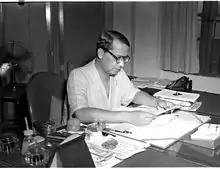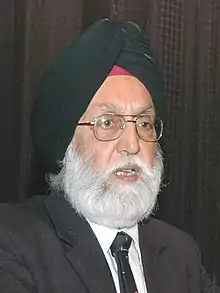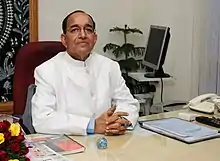Chief Election Commissioner of India
The Chief Election Commissioner heads the Election Commission of India, a body constitutionally empowered to conduct free and fair elections to the national and state legislatures and of President and Vice-President. This power of the Election Commission of India is derived from the Article 324 of the Constitution of India. Chief Election Commissioner of India is usually a member of the Indian Civil Service and mostly from the Indian Administrative Service. It is very difficult to remove the authority of the Chief Election Commissioner once appointed by the president, as two-thirds of the Lok Sabha and the Rajya Sabha need to present and vote against him for disorderly conduct or improper actions.
| Chief Election Commissioner of India | |
|---|---|
 | |
| Election Commission of India | |
| Nominator | Government of India |
| Appointer | President of India |
| Term length | 6 yrs or up to 65 yrs of age (whichever is earlier) |
| Deputy | Election Commissioners of India Deputy Election Commissioners of India |
| Salary | ₹250,000 (US$3,500) per month[1][2] |
| Website | Election Commission of India |
 |
|---|
| This article is part of a series on the politics and government of India |
|
|
Despite the recent changes in the hierarchy, the system always had powers to impose unambiguous rules and guidelines that applied across the entire nation e.g. as to how the ballots will be cast and counted, what will be regarded as 'unqualified' vote. India was probably one of the first countries in the world to go for a completely electronic ballot in the parliamentary elections in 2014.[3] What made this remarkable was that the Election Commission of India had successfully implemented this across the entire diverse Indian population that also consisted of the rural illiterate people.
While the office has always been an important one in the machinery of the Indian political process, it gained significant public attention during the tenure of T.N. Seshan, from 1990 to 1996. Seshan is widely credited with undertaking a zealous effort to end corruption and manipulation in Indian elections.[4][5][6] Though he made significant progress, several politicians attempted to derail these efforts. In particular, the expansion of the Election Commission to include the two Election Commissioners (in addition to the Chief Commissioner) was seen as a move to curtail the commissioner's ability to act aggressively.
Suggested reforms
In June 2012, Lal Krishna Advani, a veteran Indian politician and former Deputy Prime Minister of India (as well as former Leader of the Opposition in Indian Parliament),[7] suggested that appointment of CEC (as well as the Comptroller and Auditor General of India (CAG)) should be made by a bipartisan collegium consisting of the Prime Minister, the Chief Justice, the Law Minister and the Leaders of the Opposition in the Lok Sabha and the Rajya Sabha.[8][9] Subsequently, M Karunanidhi, the head of Dravida Munnetra Kazhagam (DMK) party and five times Chief Minister of Tamil Nadu[10] supported the suggestion. Advani made this demand to remove any impression of bias or lack of transparency and fairness because, according to him, the current system was open to "manipulation and partisanship".[8][9] Similar demand was made by many former CEC's such as B B Tandon, N Gopalaswamy and S Y Quraishi.[11][12]
Compensation
| Salary |
|---|
| ₹250,000 (US$3,500) monthly[1][2] |
By the "Election Commission (Condition of Service of Election Commissions And Transaction of Business) Act, 1991", the salary of the chief election commissioner is the same as salary of a Judge of Supreme Court of India.[1] If there are other election commissioners appointed by the President to help the chief election commissioner, they also receive the same salary.
List of Chief Election Commissioners
The following have held the post of the Chief Election Commissioner of India.[13]
| No. | Name | Portrait | Term of office | |
|---|---|---|---|---|
| 1 | Sukumar Sen |  |
21 March 1950 | 19 December 1958 |
| 2 | Kalyan Sundaram | 20 December 1958 | 30 September 1967 | |
| 3 | S. P. Sen Verma | 1 October 1967 | 30 September 1972 | |
| 4 | Nagendra Singh | 1 October 1972 | 6 February 1973 | |
| 5 | T. Swaminathan | 7 February 1973 | 17 June 1977 | |
| 6 | S. L. Shakdhar | 18 June 1977 | 17 June 1982 | |
| 7 | R. K. Trivedi | 18 June 1982 | 31 December 1985 | |
| 8 | R. V. S. Peri Sastri | 1 January 1986 | 25 November 1990 | |
| 9 | V. S. Ramadevi |  |
26 November 1990 | 11 December 1990 |
| 10 | T. N. Seshan |  |
12 December 1990 | 11 December 1996 |
| 11 | M. S. Gill |  |
12 December 1996 | 13 June 2001 |
| 12 | James Michael Lyngdoh | 14 June 2001 | 7 February 2004 | |
| 13 | T. S. Krishnamurthy | .jpg.webp) |
8 February 2004 | 15 May 2005 |
| 14 | B. B. Tandon |  |
16 May 2005 | 29 June 2006 |
| 15 | N. Gopalaswami | .jpg.webp) |
30 June 2006 | 20 April 2009 |
| 16 | Navin Chawla | .jpg.webp) |
21 April 2009 | 29 July 2010 |
| 17 | S. Y. Quraishi | .jpg.webp) |
30 July 2010 | 10 June 2012 |
| 18 | V. S. Sampath |  |
11 June 2012 | 15 January 2015 |
| 19 | Harishankar Brahma | .jpg.webp) |
16 January 2015 | 18 April 2015 |
| 20 | Nasim Zaidi |  |
19 April 2015[14] | 5 July 2017 |
| 21 | Achal Kumar Jyoti | %252C_in_New_Delhi_on_July_06%252C_2017_(1)_(cropped).jpg.webp) |
6 July 2017[15] | 22 January 2018 |
| 22 | Om Prakash Rawat | .jpg.webp) |
23 January 2018[16] | 1 December 2018 |
| 23 | Sunil Arora | .jpg.webp) |
2 December 2018[17][18] | Incumbent |
References
- "Election Commission (Condition Of Service Of Election Commissions And Transaction Of Business) Act, 1991". Vakil No. 1. Archived from the original on 23 January 2013. Retrieved 17 September 2012.
- "The High Court and Supreme Court Judges Salaries and Conditions of Service Amendment Bill 2008" (PDF). PRS India.
- "Why India stands out as a gold standard in electronic voting". The Economic Times. 14 May 2017. Retrieved 10 March 2019.
- Das, Sanjib Kumar (1 May 2014). "The man who cleaned up India's elections". Gulf News. Retrieved 10 August 2016.
- Narasimhan, T. E. (12 May 2012). "The more you kick me..." Business Standard. Retrieved 9 August 2016.
- Srivastava, Ritesh K.(The Observer) (5 March 2012). "Empowering the EC". Zee News. Retrieved 19 December 2014.
- "Members Bioprofile". Lok Sabha of India/National Informatics Centre, New Delhi. Archived from the original on 29 April 2011. Retrieved 27 April 2011.
- "Karunanidhi backs Advani's view on collegium to appoint CAG, EC". The Times of India. 5 June 2012. Retrieved 5 October 2012.
- "Karunanidhi backs Advani's plea for collegium". The Hindu. Chennai. 5 June 2012. Retrieved 5 October 2012.
- "DMK's Official Homepage-Chennai-Tamilnadu-India 800x600 screen resolution". Dmk.in. 9 December 2011. Archived from the original on 21 July 2011. Retrieved 24 January 2012.
- "Collegium needed to select EC: SY Quraishi". The Times of India. 16 July 2012.
- "Ex-CECs backed collegium, Law Ministry not too keen". The Indian Express. 10 June 2012. Retrieved 5 October 2012.
- "Previous Chief Election Commissioners". Election Commission of India. Archived from the original on 21 November 2008.
- "Election Commission of India". ECI.nic.in. Retrieved 11 June 2017.
- Borgohain, Sonalee, ed. (3 July 2017). "India's new Chief Election Commissioner Achal Kumar Jyoti to take charge on 6 July". India Today. Retrieved 2 September 2017.
- "Om Prakash Rawat to succeed AK Joti as new Chief Election Commissioner". The Indian Express. New Delhi. 21 January 2018. Retrieved 21 January 2018.
- "President Kovind appoints Sunil Arora as new Chief Election Commissioner". 26 November 2018. Retrieved 27 November 2018.
- "Sunil Arora takes over as Chief Election Commissioner, will oversee 2019 polls". 2 December 2018.
External links
 Media related to Chief Election Commissioner of India at Wikimedia Commons
Media related to Chief Election Commissioner of India at Wikimedia Commons